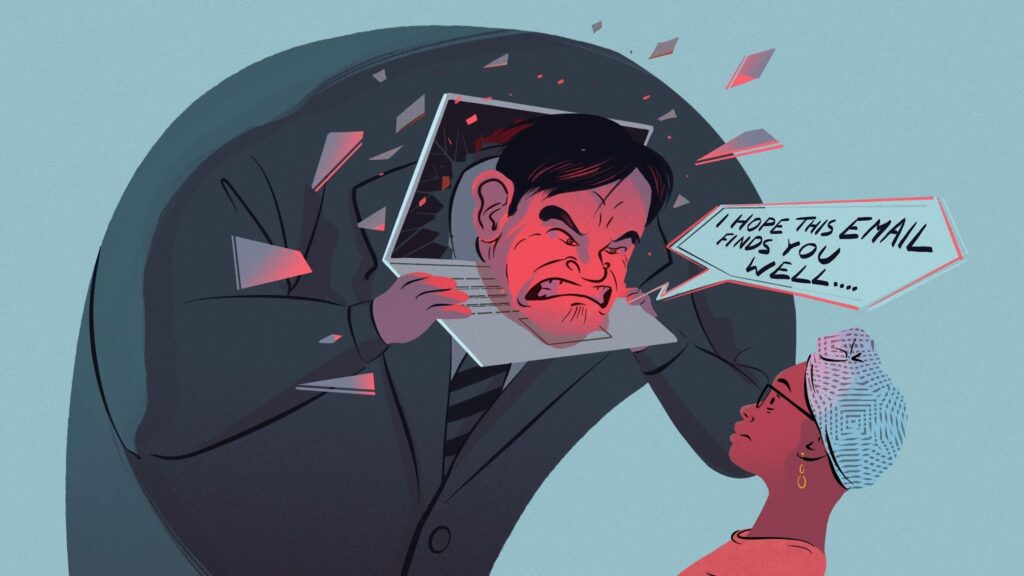A freelancer’s work isn’t complete when we finish a job or receive payment for an invoice – in the digital age, it continues to the online space, where you are expected to build and maintain a brand.
In essence, your brand reflects you and your freelance business – it has to reflect your core values. It can encompass a CV, portfolio or social media, and it needs maintaining. Trying to update everything and everyone with your new achievements can become exhausting, so here’s how to build your online brand sustainably.
I, personally, took inspiration from my favourite freelancer’s portfolios. I started from there – something I highly recommend – gathering inspiration is vital in building a sustainable brand – don’t try to reinvent the wheel.
Shahed Ezaydi, 26, says she tends not to pressure herself when updating her online freelancing profile. Instead, she tries to share her work and engage in other people’s work so that she still maintains an active presence online and in the media and journalism industry.”
Shahed continues, saying, “Having a significant online presence has definitely been a big factor in where I’m at in my freelance career today.”
I remember in my university journalism course having a whole lecture dedicated to building a brand. That was the day I created my Twitter account as I learnt about the importance of the site for my career trajectory.
I quickly learned that Twitter was the treasure trove for any journalist. Adam England also places great importance on Twitter. The freelancer said the platform had played a big part in his branding. “I do a lot of networking and make a lot of contacts and friends on there – the nature of the platform allows you to strike a balance between being professional and letting your personality come through too.” Like Adam, I currently use Twitter heavily for building my online brand as a freelancer. I have amassed over 2,000 followers in two years, and it is my most successful platform to date. I immediately open it when I have a new article to share with my mutual journalists and help editors see what I am writing, which Adam recommends. “Get your name out there. Be professional, and share your work – tagging in people you’ve spoken to or the publication you wrote for – but don’t be afraid to share your opinion.”
Esther Newman, a 26-year-old freelancer said: “Out and about, people are more likely to ask for a social handle or web URL.”
Beyond Twitter, a portfolio. But you can also opt to go for a professional, of course. Esther chose to go to a graphic designer and an illustrator for her branding. “I use [the logo created by the professionals] on LinkedIn and Instagram, but that’s it. As I mentioned, I like to keep my socials as mine rather than work-only, and I feel like my website is where potential employees will look first.”
A key to building a successful brand is keeping it updated. If your portfolio is missing pieces, then now’s the time to add them. Likewise, if you haven’t updated your followers on your progress, it might be wise to let them know that you’re still in the game. Remember, many editors and jobs are active on Twitter, so not using it could be a waste of resources.
Adam also rightfully points out that online branding isn’t an overnight miracle, a crucial point in a time-sensitive industry. “I’ve been gradually building my online brand since 2017. it’s more a case of adding things over the years, amassing followers and growing my platform.” Adam adds taking time out to focus on building an online brand is worth the effort in the long run.
Another way to build an online brand is to start something in this digital realm – for example, a newsletter, publication or company that helps reflect your freelance values. This can help you make a name for yourself if it is valuable and consistent.
Shahed’s advice for building an online brand is: “Always stay genuine and authentic in who you are, and don’t just post or share the type of content that you think will amplify your online presence, because people can see right through it.”
Shahed, like me, recognises the importance of online branding. “It’s an incredible tool for getting your name and work out there.” She adds, “It’s also been a brilliant place to meet and talk to fellow creatives, where I’ve been able to ask questions or share info about pitches or general work. As much as my career is my own hard work, I have a lot to thank my corner of the internet for!”
My freelance career, like Shahed’s, has benefited from my online presence. Esther too can attest to this, but she also says your online presence doesn’t have to be strictly professional, adding that she also tweets about Taylor Swift more than her work in an effort to build a reputation as a real-life person, not as a “journalism-only machine”. Esther says investing in branding could make you seem more creative and personable. “At the end of the day, we as freelancers are brands, and we need to put the time, effort and (in some cases) money into building our brands because no one else is going to do it for us!”




